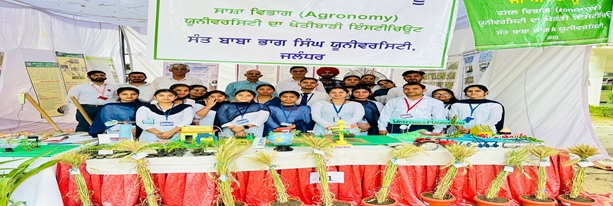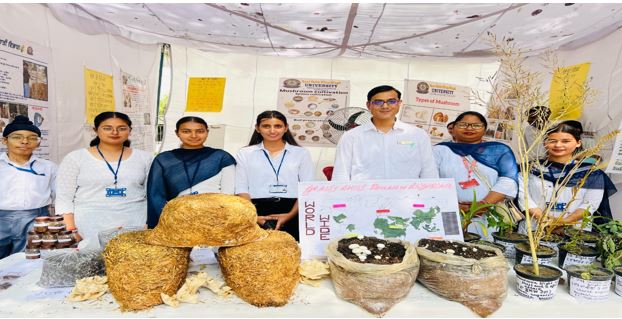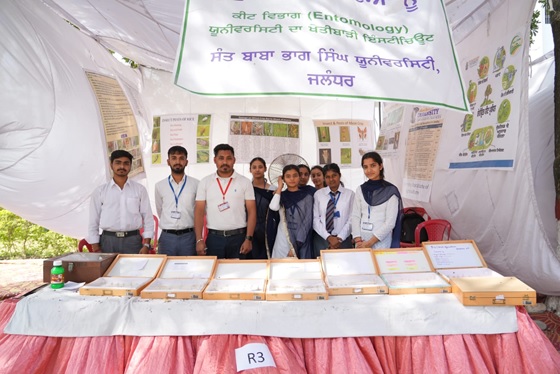Date: 11th April 2025
Event Venue/Time: SBBS University
Organizing Unit/Agency: University Institute of Agriculture (UIA)
Kisan and Community Mela
Sant Baba Bhag Singh University organized the Agrotech Kisan and Community Mela on 11th April 2025. The event was aimed at promoting awareness and knowledge-sharing among farmers, students, and agricultural professionals. A variety of agriculture-related stalls were set up along the university’s main road

As part of the Agrotech Kisan and Community Mela, the Plant Pathology stall showcased a variety of informative and engaging exhibits aimed at educating both farmers and students about plant health, disease management, and value-added products.
Two popular mushroom varieties—Button and Oyster—were exhibited. In addition to fresh samples, farmers were introduced to value-added products derived from button mushrooms, including:
The stall attracted a large number of farmers who showed strong interest in mushroom cultivation techniques and by-products. Enthusiastic and well-prepared B.Sc. 8th semester students effectively addressed all queries, offering practical insights and sharing cultivation experiences.
Visitors appreciated the efforts and expressed satisfaction with the depth of knowledge and interactive learning experience provided at the stall.
A wide variety of live diseased plant specimens were displayed to raise awareness about prevalent plant diseases affecting crops. The exhibition served as an eye-opener for many farmers who were keen to understand identification and management strategies.
Faculty members present at the stall offered expert guidance on the diagnosis and effective management of these plant diseases. Their professional advice ensured that visitors left the stall with clear, practical, and implementable solutions for protecting their crops.
The expert guidance and student involvement were both well-received and contributed significantly to the educational success of the event.


As part of the Agrotech Kisan and Community Mela held on 11th March 2025, the Entomology Stall was successfully managed by Dr. Ombir and Mr. Rajesh Kumar, along with the enthusiastic participation of B.Sc. (Hons.) Agriculture students. The stall served as an informative and interactive platform for farmers, researchers, and industry professionals to explore emerging trends and practices in insect science.
The stall featured comprehensive displays and demonstrations on Integrated Pest Management (IPM) strategies. These included:
Farmers were educated on the importance of using sustainable and environment-friendly techniques to manage insect pests, ensuring minimal impact on beneficial species.
Live demonstrations and visual displays showcased various beneficial insects such as:
These exhibits emphasized the ecological value of beneficial insects and raised awareness about their conservation in modern agriculture.
The Entomology stall at the Agrotech Kisan and Community Mela significantly contributed to farmer awareness and knowledge dissemination. Through hands-on learning and expert guidance, it highlighted the crucial role of entomology in sustainable farming practices. The efforts of Mr. Rajesh Kumar and the participating students were highly appreciated by visiting farmers and dignitaries.

The Horticulture Stall made a significant and impactful contribution to the Agrotech Kisan and Community Mela, serving as a vibrant hub of education, innovation, and farmer engagement. The stall was jointly coordinated by Dr. Shalu Vyas, Dr. Parshotam Singh Tyagi, and Dr. Manisha, with valuable support from lab assistants Ms. Manpreet Kaur and Ms. Gurpreet Kaur. The team worked in harmony to deliver a well-organized and interactive experience for visitors.
A major draw for attendees, the sale of seasonal vegetable seedlings appealed to both kitchen gardeners and commercial vegetable growers, encouraging interest in home-scale and profitable cultivation.
The exhibition of exotic horticultural crops sparked discussions about their market potential, growing conditions, and suitability for Indian climates.
A variety of fruit-bearing plants were made available for purchase, catering to the needs of small-scale farmers, orchardists, and gardening enthusiasts.
Visitors appreciated specially prepared packets of medicinal plants and products, including:
These items highlighted the intersection of horticulture and health, emphasizing the utility of medicinal plants in daily life.
The stall promoted floriculture and home gardening through the distribution and sale of quality flower seeds, fostering interest in beautification and biodiversity.
A major attraction was the hydroponic unit innovatively developed by Dr. Parshotam Singh Tyagi. This soil-less, space-efficient farming technique generated great interest among farmers and students, prompting conversations around sustainable and modern cultivation methods.
The Horticulture Stall received an overwhelming response, with enthusiastic participation from farmers, university staff, and students. It effectively demonstrated the department's applied research, promoted awareness about horticultural innovations, and established a strong connection with the farming community.
Overall, the stall successfully fulfilled its objective of promoting horticulture as a vital component of modern and sustainable agriculture.
Stall no. 2 set up a vibrant, educational, and interactive display aimed at enhancing awareness among farmers about modern horticultural practices and technologies. The stall was thoughtfully designed to combine technical knowledge with practical demonstrations, making it accessible and engaging for visitors.
The Horticulture Stall attracted enthusiastic participation from farmers, horticulturists, and agriculture enthusiasts. Visitors appreciated the practical demonstrations, availability of expert advice, and the hands-on learning experience. The involvement of postgraduate students added further value, promoting dialogue between future professionals and current practitioners.
Overall, the stall successfully contributed to capacity building, encouraged the adoption of sustainable horticultural practices, and strengthened the link between academic knowledge and community application.
.jpg)
.jpg)
.jpg)
The Soil Science Stall at the Agrotech Kisan and Community Mela was led by Dr. Vijay Singh, who, along with supporting students and staff, provided valuable demonstrations and services to the farming community. The stall was well-received and served as an important platform for educating farmers about soil health management and sustainable farming practices.
Dr. Vijay Singh demonstrated the correct procedure for soil sampling, emphasizing its importance in assessing soil fertility and planning crop nutrition.
Using a portable soil testing kit, Dr. Singh conducted on-the-spot testing of soil samples brought in by farmers. The tests provided quick insights into the nutrient status and pH levels of their soil, helping them make informed decisions for crop planning.
A step-by-step vermicomposting process was displayed, showcasing how farmers can convert organic waste into nutrient-rich compost using earthworms. This low-cost and eco-friendly technique attracted significant attention.
The stall also offered high-quality vermicompost for sale, which was well-received by the farmers. Many visitors made purchases, reflecting a growing interest in organic and sustainable soil enhancement methods.
Farmers actively engaged with the stall to gather information not only about soil sampling and vermicomposting but also about crop-specific soil management techniques. The queries were addressed comprehensively by Dr. Singh, ensuring the farmers left with actionable knowledge.
The Soil Science Stall effectively bridged the gap between laboratory knowledge and field-level application. By offering live demonstrations, testing services, and direct farmer interaction, the stall significantly contributed to raising awareness about soil health and sustainable farming practices. Dr. Vijay Singh’s leadership and the farmers’ enthusiastic participation made the stall a key success in the Mela.

In addition to the departmental academic and technical stalls, various other stalls were arranged by the Department of Agriculture in collaboration with private enterprises, farmer producer organizations (FPOs), self-help groups (SHGs), and research institutions. These stalls aimed at promoting innovation, entrepreneurship, and sustainable practices in agriculture.
These additional stalls significantly enriched the Mela by promoting:
They also provided students and visitors with exposure to real-world agricultural practices, startups, and community-driven development models.
.jpg)
.jpg)